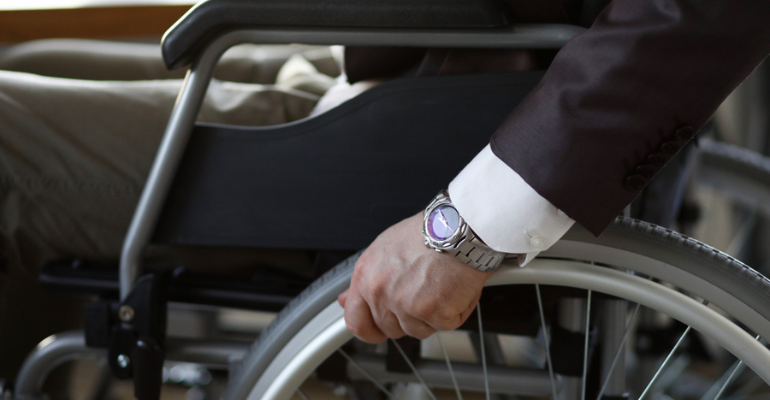
How to Prove Disability Discrimination
Disability discrimination in the workplace is an irrational and unjustifiable wrong that no one should have to endure. Sadly, it is more common than most would like to believe, and it comes from many sources.
Your boss and other employees can discriminate against you, and your employer may also discriminate through an illegal policy that treats disabled workers unfairly.
Fortunately, Florida law allows victims of disability discrimination to pursue compensation for this type of wrongdoing. However, this involves a detailed process that requires victims to present enough clear evidence to sustain their claims.
Seeking the aid of an experienced disability discrimination lawyer is recommended to fully explore the avenues available for proving the existence of disability discrimination.
Disability Discrimination in the Workplace Examples
What is disability discrimination? According to Florida law, disability discrimination exists when an employee is mistreated because of an actual or perceived disability.
The Florida Civil Rights Act (FCRA) makes this practice illegal but does not give an exact definition of what a disability is. However, federal law provides much guidance.
According to the Americans with Disabilities Act (ADA), three instances of disability include:
- A mental or physical impairment that substantially limits a significant life activity
- A history of such a mental or physical impairment
- Being considered by others as having a disability
Another question is, “how are disabled people discriminated against?” In the workplace, discrimination can manifest in various ways, all of which lead to the deprivation of workers’ rights under federal and state disability discrimination acts. Typical instances of discrimination in the workplace might include:
- Not hiring an individual based on an actual or perceived disability
- Failing to promote a disabled worker who is qualified and worthy
- Failing to provide a reasonable accommodation for a disabled employee
- Retaliating against an employee for a reasonable accommodation request
- Firing or demoting an employee because of a disability
- Assigning unreasonable work assignments
- Scheduling limited hours because of a disability
- Unreasonably denying a disabled employee health insurance
The situations in which an employee might face discrimination are almost limitless, and the above-listed examples are some of the more common problems of workplace discrimination.
Can I Sue for Disability Discrimination?
You have the right to file a lawsuit. But how do you sue for disability discrimination? First, it is essential that you can prove discrimination took place, and victims must meet evidentiary requirements to be successful with a discrimination claim.
A skilled disability discrimination lawyer is crucial for victims who want peace of mind that their case has a good chance of succeeding. With an experienced advocate, you won’t have to worry about legal technicalities or wonder if your case is proceeding correctly according to the rules of procedure.
If you are the victim of disability discrimination, it is important to know that significant time limits govern your claim. Failure to abide by these deadlines can mean the invalidation of your claim.
When you decide you want to file a claim, you must take quick action and file with the Florida Commission on Human Relations (“FCHR”) within 300 days of the discriminatory act. If the discriminatory acts continue over time, the clock starts when the last action is terminated.
Once a charge of discrimination is filed, the FCHR then has 180 days to investigate the claim and determine whether reasonable cause exists or not. If good reason exists, you have one year to file a lawsuit.
As you can see, the time limits are tight but not impossible to comply with for victims of disability discrimination who act quickly.
Disability Discrimination Lawsuit Settlement Amounts
How much is a disability discrimination lawsuit worth? It depends, and settlement amounts vary from case to case and heavily rely on the extent of the damages a discrimination victim suffers.
Additionally, lawsuits under federal law using the ADA may have different monetary award amounts than those brought under Florida’s FCRA, mainly due to the availability of punitive damages under the ADA.
It is not always possible to accurately predict what a discrimination case might be worth. Additionally, settlement terms and numbers are typically unavailable to the public.
However, according to the Equal Employment Opportunity Commission, the average out-of-court settlement for discrimination cases is $40,000. But this figure is only an average, and some victims receive substantially more compensation for their damages.
One of the main factors determining the amount of your settlement or verdict is the extent of your losses. Losses, or damages, are the negative impacts you experience due to discrimination, typically monetary or nonmonetary.
Monetary Losses
Monetary losses you might experience due to disability discrimination include loss of both back and front pay. You may also claim loss of healthcare and other benefits you may have been entitled to but were denied.
Nonmonetary Losses
The law also recognizes intangible, nonmonetary losses, such as emotional distress and suffering caused by discrimination or retaliation from an employer, supervisor, or other employees.
Punitive Damages
Depending on how you file your lawsuit and the specifics of your case, you may be entitled to punitive damages intended to punish particularly bothersome behavior by discriminators.
Legal Fees
Legal fees are your attorney’s compensation, typically calculated from the settlement or verdict they win for you. You may also be able to recover court costs.
What Is Considered Proof of Disability Discrimination?
Proving disability discrimination can be daunting, especially when your employer and other employees close ranks and hamper your efforts to get justice for your discrimination.
However, no victim will ever be relieved of their duty to present substantial evidence of their disability discrimination. Although it is a challenge in some cases, finding the evidence you need is achievable.
Generally speaking, the evidence you collect will either be direct or circumstantial. Direct evidence refers to statements, actions, or other explicit evidence from an employer that causes discrimination, and it is typically the most vital type of evidence. For example, an employer’s statement that they are demoting you because of your disability is direct evidence.
Direct evidence is not always available for discrimination cases because those who discriminate are careful not to give direct evidence of their misdeeds. Savvy employers and managers work hard to cover their tracks.
As a result, victims of discrimination often have to rely almost exclusively on circumstantial evidence to prove their claims. Circumstantial evidence is evidence that implies that discrimination has occurred. With enough evidence of this nature, your attorney may be able to build a strong case.
The answers to these questions may indicate that you have enough circumstantial evidence to sustain a claim:
- Were you treated differently than a non-disabled individual with the same qualifications?
- Did bosses negatively refer to your disability or people with your disability?
- Did your boss hire non-disabled workers less qualified than you for the same work?
- Have other disabled employees at your job complained about discrimination?
- Are other disabled workers being singled out for discriminatory treatment?
- Does your boss have a history of discrimination?
- Is your situation so unusual or unjust that it most likely qualifies as discrimination?
Whether you use direct or circumstantial evidence, you will need to collect proof. Much of the evidence gathering will be done by your disability discrimination attorney through investigations and depositions; however, you can also effectively gather evidence for your case, mainly if you are still employed at the place where the discrimination occurred.
Write Down Everything
Your written testimony can be powerful for your claim. Hence, it’s worthwhile for you to take the time to consistently record discriminatory behavior whenever it occurs, no matter how “light” the discrimination is.
Keep All Employment-Related Communications
Evidence of discrimination against you might be found in one of the various ways your boss and employers communicate with you.
For example, you might find evidence of discrimination in texts and emails. Voicemails may also contain valuable evidence. So you should review all communications and save those that might serve as evidence for your case.
Media
Bosses who discriminate may do so using one of the many forms of media that are prevalent in the modern world.
For example, video footage of discrimination might be available from company cameras and employees’ cameras. Photos may also be helpful, such as a photo of a discriminatory word written on the board in an employee break room. Fortunately, capturing video and still images is easier than ever.
Talk to Other Workers
Your fellow employees may be critical to the success of your discrimination lawsuit — even those who participate in the discrimination. Spend time speaking with them and note any statements they give that might be relevant to your case.
At no time should you do anything illegal when searching for evidence. You may face significant liability and retaliation by building your case illegally. To help ensure you don’t run afoul of the rules while readying your case, hire a seasoned disability discrimination attorney.
Working with a Disability Discrimination Attorney
Proving disability discrimination is, in some aspects, more difficult today than in the past. Employers and bosses have learned to mitigate liability by not leaving direct evidence of misdeeds. A seasoned disability discrimination attorney can help you build a strong case.
The process begins by scheduling a consultation with a discrimination attorney who has a track record of successfully representing clients in this arena. They will know what it takes to get you the compensation you deserve because they know how to prove disability discrimination.
They will also know whether your case rises to the level of actionable discrimination. The initial consultation is free, so it is worth your time and effort to set one up and learn what options you have.
During this consultation, the attorney will review the facts and circumstances of your situation and evaluate the evidence. The more evidence you can bring into your first consultation, the easier it will be for an attorney to analyze your case.
If they decide to take your case, they will immediately get to work preserving what evidence you have brought them and gathering more when necessary. Doing so might require them to contract the services of an investigator or a legal video and deposition service.
Regardless of what your case requires, once you retain the services of a disability discrimination lawyer, you have a good chance of recovering a compensation figure that is worthy of the damages you have suffered.
At Wenzel Fenton Cabassa P.A., we regularly help disabled workers preserve their dignity by fighting for the compensation they need to address their losses. Our successful experience is proof that we know how to prove disability discrimination.
If you or a loved one is facing disability discrimination in the workplace, call our office today for potential representation from a seasoned disability lawyer with a record of success and care.
Please Note: At the time this article was written, the information contained within it was current based on the prevailing law at the time. Laws and precedents are subject to change, so this information may not be up to date. Always speak with a law firm regarding any legal situation to get the most current information available.








